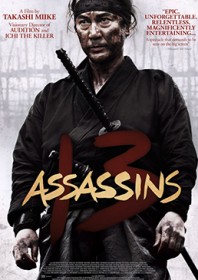
A remarkable samurai film from idiosyncratic director Takashi Miike, based on Eiichi Kudô’s 1963 film. Miike is a filmmaker renowned for controversy and unpredictability who first gained international acclaim for the lulled, twisted nightmare of Audition in 1999 and the horrific Ichi the Killer. He is a filmmaker capable of creating genuinely shocking moments, but never at the expense of character or motive. The brooding suspense he conjures up here shows a clarity of vision far beyond his reputation as an enfant terrible, and the violence is finely balanced between being both comic book in nature and brutal when it needs to be. There are lighter moments in the story, too, so typical of Miike; a philosophical country waif adds a whimsical note, and the more affable side to Kôji Yakusho’s central character, Shinzaemon, is reminiscent of Toshiro Mifune’s charismatic ronin from Seven Samurai.
The first part of the film simmers with hushed, clandestine meetings under candlelight before exploding in a climactic bloodbath lasting close to an hour. An ambush is set in a rural, booby-trapped village where the titular 13 assassins face an insurmountable onslaught from Lord Naritsugu’s 200-man army. Miike goes to town with wooden drawbridges, huge explosions, wildebeest on fire (the film’s only dodgy moment), bows and arrows, mud fights and a huge, almighty sword battle. Miike shows himself to not only be a master at coherent, large-scale carnage, but also the intimacy of close combat. The relentlessness of the battle borders on the comedic, as if Miike has vowed to out-do Tarantino’s Crazy 88 sequence from Kill Bill: Vol. 1. The showdown shares a dramatic narrative all of its own, and acts as a metaphor for the dying embers of the Shogun era in mid-19th century Japan.
The character of Akashi clan leader Lord Naritsugu (Gorô Inagaki) is an icy sadist with a death wish – a transposed Ichi the Killer in period costume – who represents a cold harbinger of the samurai’s doomed fate. He’s a privileged, modern enemy without remorse or respect for ancient traditions or the rules of law. He is offered a seat on the Shogun council purely due to his distinguished lineage as the son of the former Shogun. A respected samurai performs seppuku in protest which sends an initial warning sign, but most of the established samurai – fearful of their own faltering status in society – swear allegiance to the Lord under the code of Bushido, despite the fact he is a known maniac. He rapes and kills indiscriminately, including women and children. In one particularly ghastly moment, he is shown to have hacked off the limbs of a peasant girl and removed her tongue.
It’s all too much for top Shogun Lord Doi, who selects the cool head of aged samurai Shinzaemon to lead a rebel team of assassins with the core objective of killing the tyrant. Shinzaemon is a respected, patient every-man and a commandeering war leader who finds himself in the wrong era. He struggles to locate samurai capable of achieving his mission; some are poor and ask for money up front, one is a drunk, another is so inexperienced he has yet to kill. There is a real sense of an era coming to an end with the film’s closing, epic and bloody chapter. Miike quickly followed this film with a lighthearted family adventure called Ninja Kids!!!, which aptly highlights the director’s knack for seeking out unconventional projects.
- Country: Japan
- Action Director: Keiji Tsujii
- Directed by: Takashi Miike
- Starring: Gorô Inagaki, Kôji Yakusho, Masachika Ichimura, Mikijirō Hira, Takayuki Yamada, Yûsuke Iseya
- Produced by: Kôji Yoshida, Michihiko Yanagisawa, Minami Ichikawa, Shigeji Maeda, Takahiro Ohno, Tôichirô Shiraishi
- Written by: Daisuke Tengan
- Studio: Recorded Picture Company, Sedic International, Toho Film Co.












